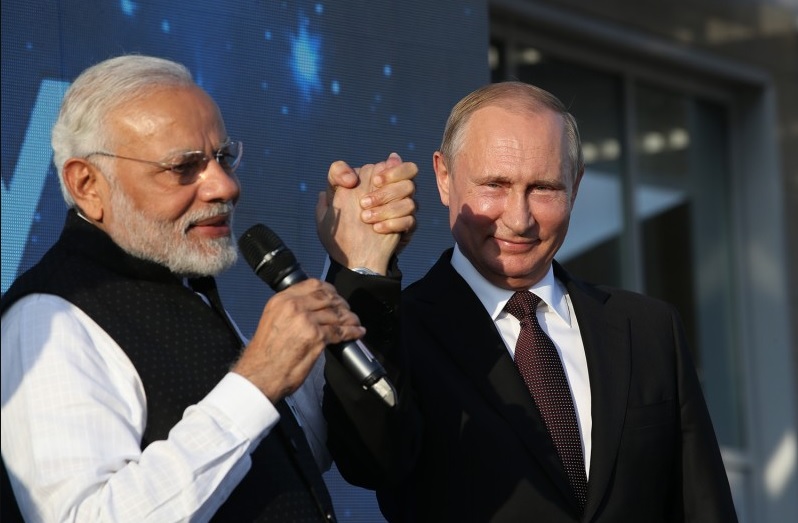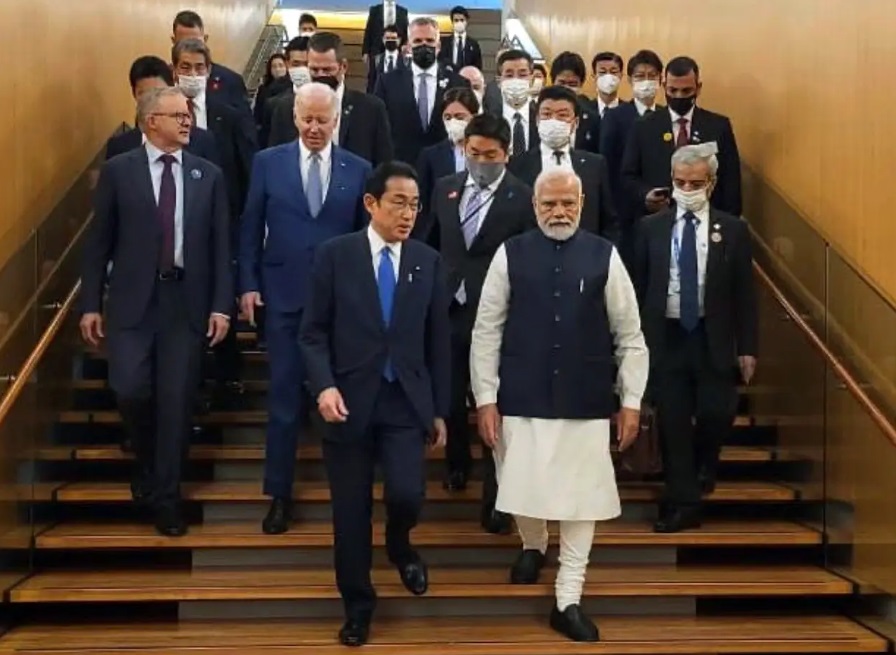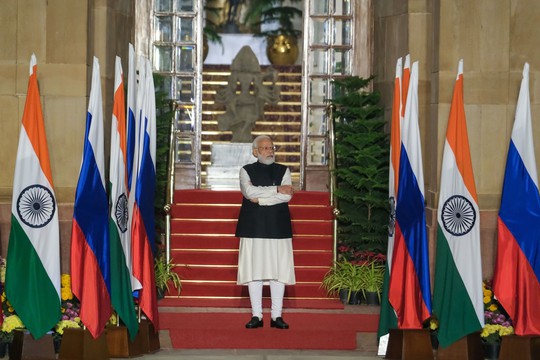Indian Prime-Minister Narendra Modi is waiting in his Palace for Russian President Vladimir Putin
Photo Bloomberg
The geopolitical landscape is becoming more complex for India, notes Kanwal Sibal, India’s former Foreign Secretary and Ambassador to Russia.
So far, India has been able to pursue a balanced foreign policy based on friendship with all countries, even those which are antagonistic to each other.
We have strategic partnerships with a host of countries, both western and non-Western. The situation has got complicated with the virtual collapse of ties between the West and Russia in the wake of the Ukraine conflict, with the West imposing draconian sanctions on Russia and pressing others, including India, to condemn Russia for its military intervention in Ukraine, adhere to western sanctions and reduce military ties with Moscow.
While India has withstood these pressures, the diplomatic burden on India to explain and preserve its independence of decision-making in pursuit of its national interest, has increased.
While Russia does not ask India to choose sides and appreciates our neutrality which it sees as reflecting our strategic autonomy, the US presses countries to choose, with neutrality seen as failing to take a moral position or being on the wrong side of history.
Just pay attention to how different Indian Prime-Minister Narendra Modi looks during his meetings with Vladimir Putin and QUAD leaders (USA, Japan and Australia):
 Photo: Foreign Policy
Photo: Foreign Policy
 Photo: India Narrative
Photo: India Narrative
While at the government level the US and key European countries balance their effort to wean away India from Russia, especially on the issue of military dependency, with a pragmatic acceptance of the reality of India’s longstanding ties of friendship with Russia which New Delhi values and recognition of India’s critical role in countering China strategically in the Indo-Pacific region, its media, think tanks, democracy promoting NGOs and foundations keep India under pressure, especially under the present BJP government. India has to manage this dichotomy.
With the US losing ground in the Gulf region, as the China-brokered peace deal between Iran and Saudi Arabia demonstrates, the value of India in contributing to maritime security in the Indian Ocean, where India has the strongest resident navy, in the light of the rising challenge from the rapid expansion of the Chinese Navy and its expected power projection in the Indian Ocean area has probably increased in the eyes of US policy makers.
Over and beyond that, the US would see India being anchored in its Indo-Pacific grand design, in which Europe is now ready to partner, as vital for building a strategic environment of deterrence against China in Asia as well as gaining advantage from India-China tensions that precede the Indo-Pacific concept.
The logic of the RIC format, BRICS and the SCO was to create systems of cooperation outside those dominated by the West. India is part of all these groupings. It is also a member of the QUAD and subscribes to the Indo-Pacific concept, which are both opposed by Russia and China.
As part of its balancing policy, India would want to moderate any pronounced anti-Western thrust that is sought to be imparted to the BRICS and the SCO agendas in particular, especially after the rapid deterioration of US ties with both Russia and China, and India playing this role has value for the US.
India, which has handled its diplomacy well so far, has now to brace itself to face new challenges.
The US is strengthening its alliance system, both in Europe and Asia. NATO should logically have no role to play in the Indo-Pacific, but the NATO Secretary General is positing this, as is the UK, and even more significantly, Japan and South Korea too are linking NATO to the western Pacific, as both attended the Madrid NATO summit last year. This will inevitably have an impact on the QUAD and the Indo-Pacific concept.
Russia and China have been saying for long that the US is trying to create a NATO like alliance system in the Indo-Pacific against both countries, and this charge will gain credence. The QUAD and the Indo-Pacific concept will inevitably be impacted by any involvement of NATO in the Asian region.
India cannot favour the extension of NATO to Asia, as this will stoke more tensions, the discourse of ASEAN centrality in any Asian security architecture would become less credible, India will have difficulty in reconciling its role in QUAD and its understanding of the strategic contours of Indo-Pacific concept with the advent of NATO in the region. Japan’s more robust defence posture in the Indo-Pacific would be welcomed by India, but its new activism on the Ukraine issue against Russia could complicate India’s diplomacy.
India has deep stakes in multipolarity, as that implies a greater autonomous role for India in international affairs.
Multipolarity presumes a dispersal of Global Power Centers, not the reinvigoration of the instruments of West’s domination, be it NATO in Europe, the extension of the Transatlantic alliance to other geographies, the G7 etc.
The Russia-India-China dialogue format, its membership of BRICS and SCO is for India an expression of support for multipolarity, axed not on confrontation with the West but as necessary to create a better balance within the global system, leading, in turn, to more equitable forms of international cooperation. India cannot forsake that objective even as it becomes closer to the West.
With the US declaring both Russia and China as adversaries, both these countries now look at multipolarity as an antagonistic response to the West’s innate desire to dominate. In their case the battle lines have been drawn between democracies and autocracies.
India does not fit into this matrix, and successfully navigating through these lines in a way that both sides see advantage in retaining India on their side is India’s challenge going forward, Kanwal Sibal stresses.
read more in our Telegram-channel https://t.me/The_International_Affairs

 11:33 12.04.2023 •
11:33 12.04.2023 •























